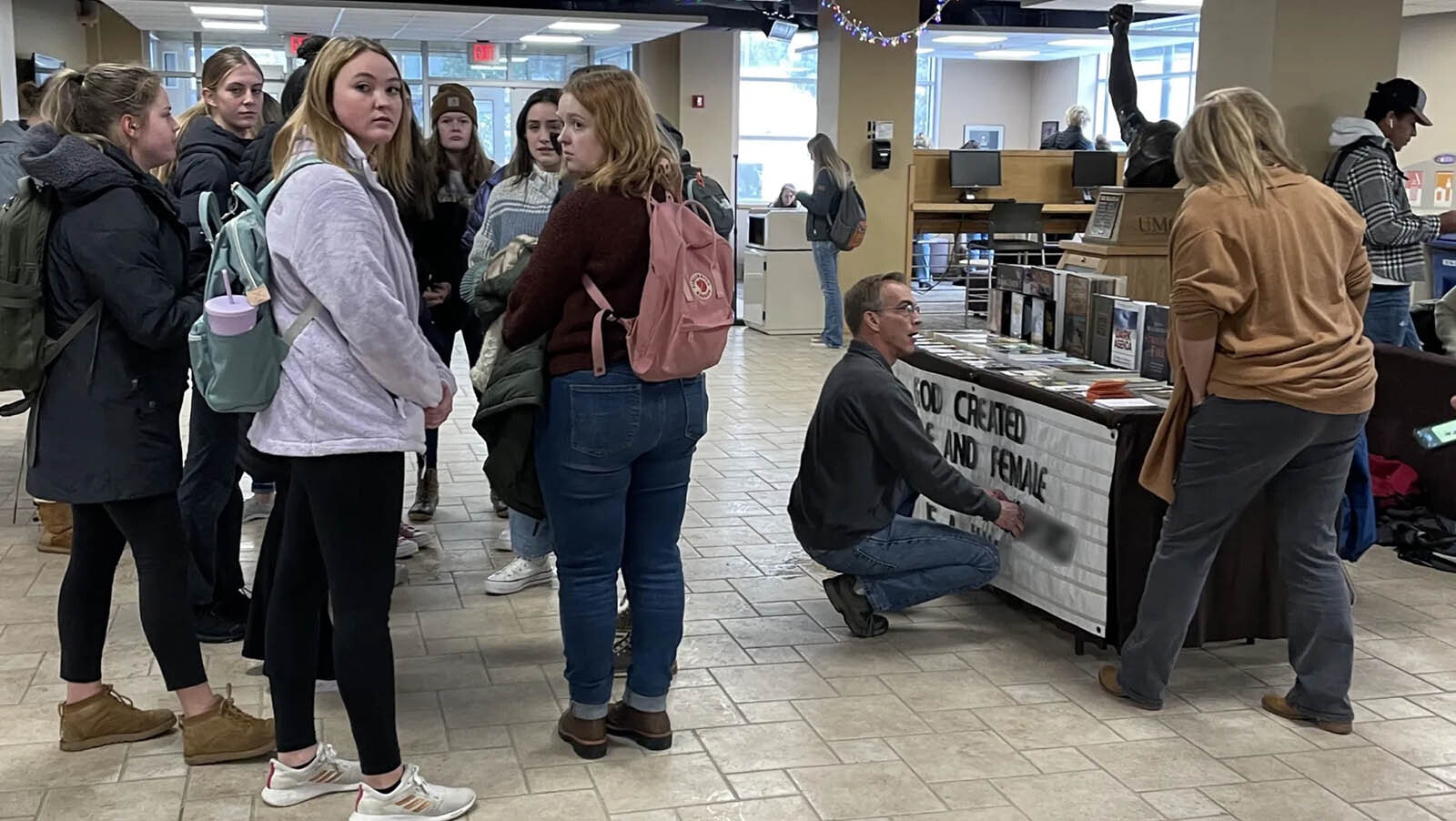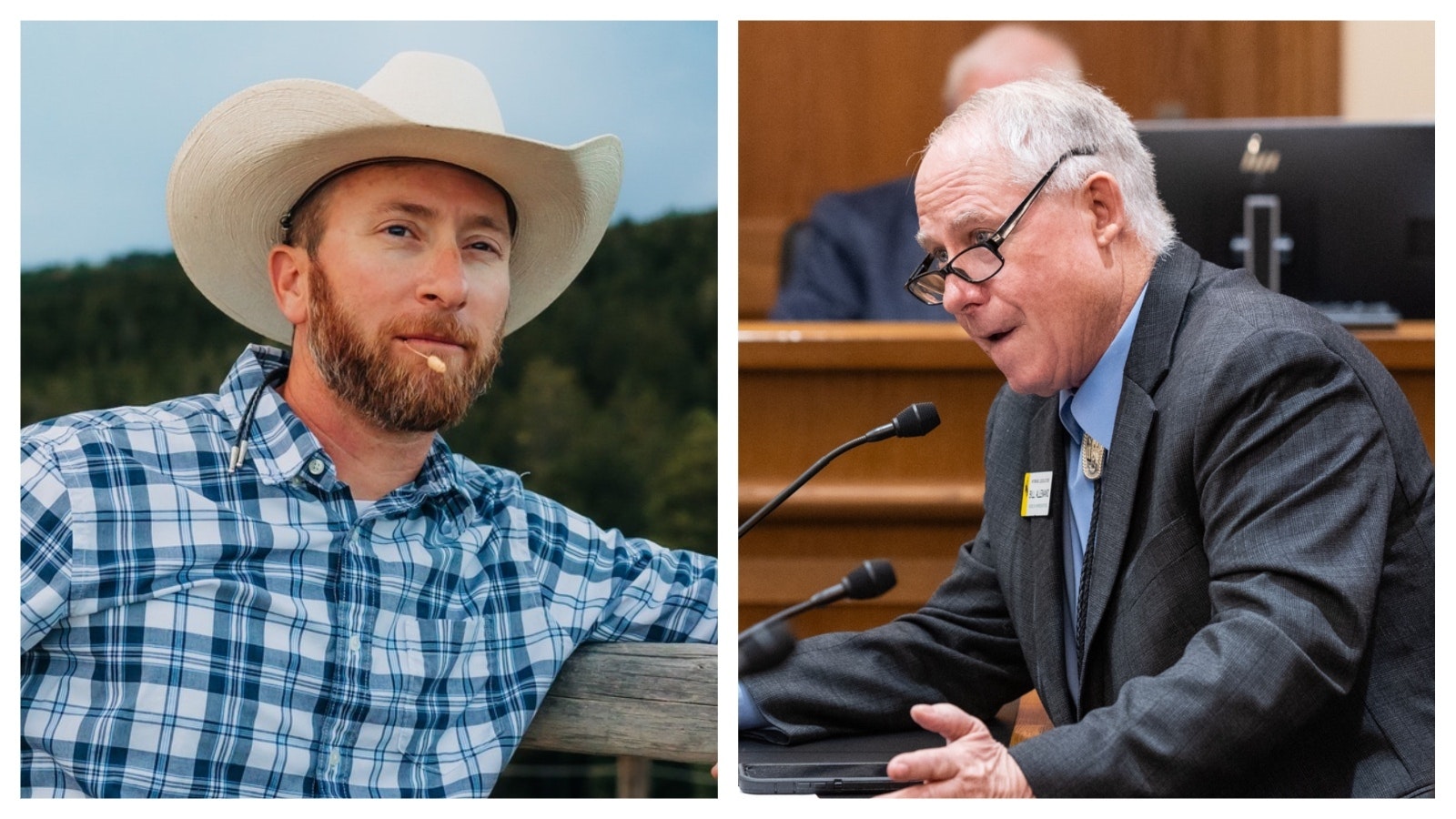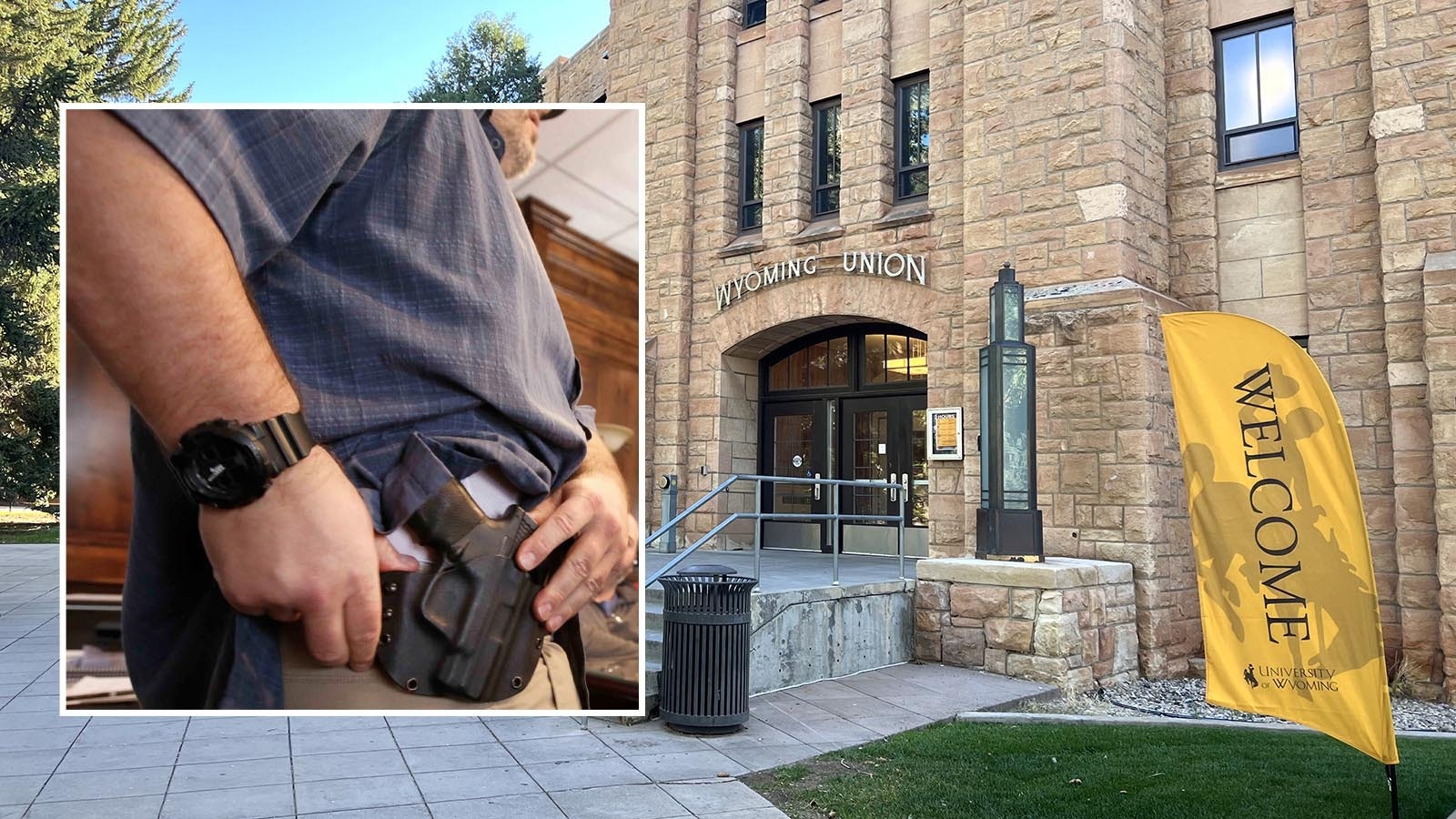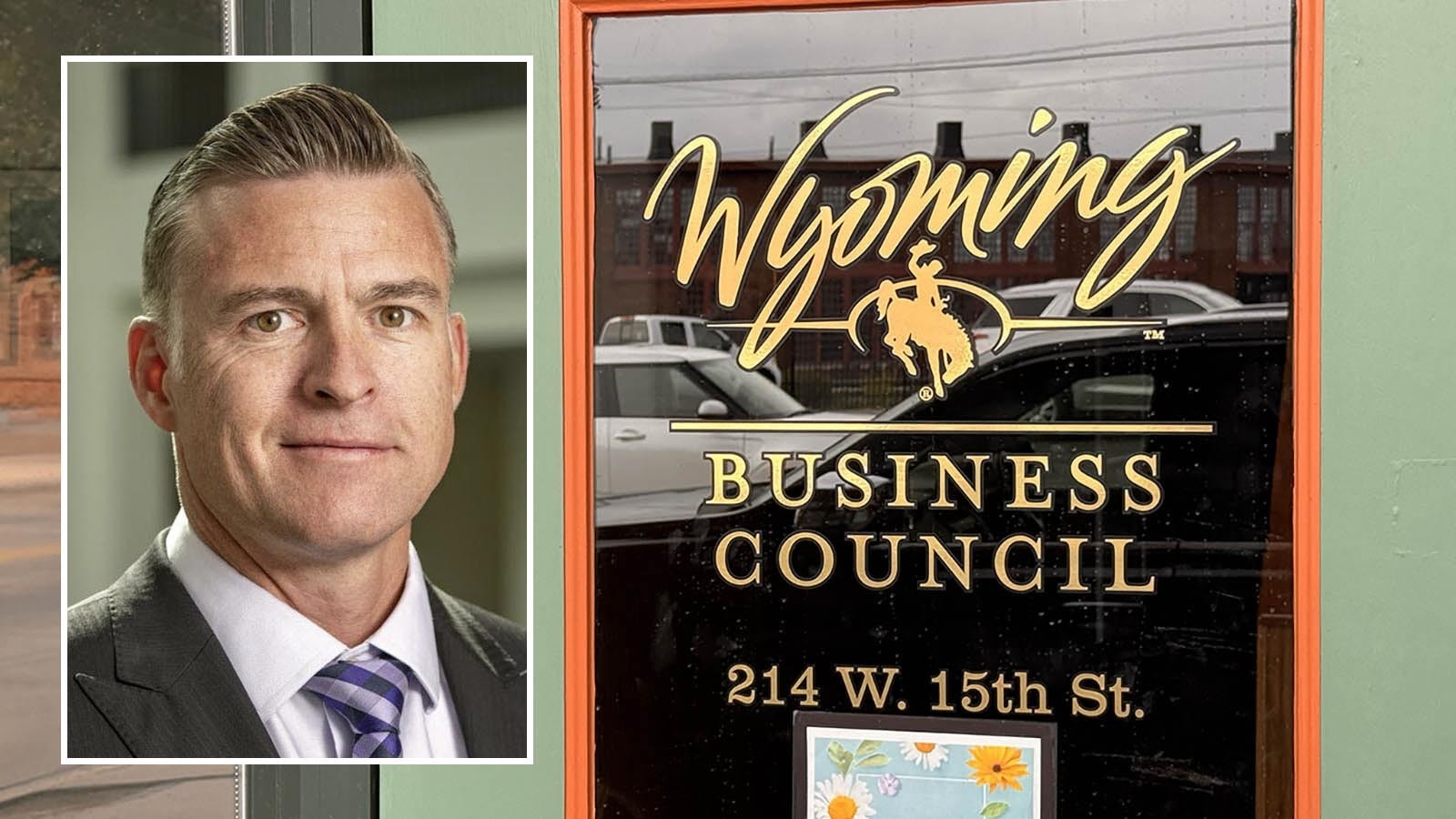A group at the University of Wyoming has spent the past six months considering how the school can better address free speech issues on campus. What it did not consider during its study was the most high-profile controversy involving free speech at the school in the last year or other isolated events.
Todd Schmidt, a Christian church elder from Laramie has filed a lawsuit against the University of Wyoming president and dean of student affairs claiming First Amendment violations for a Dec. 2 incident on campus when he was made to cover part of a sign calling out a transgender sorority member. He was later banned from evangelizing in the student union for a year.
“Since we were not formed in reaction to a specific incident, we did not make recommendations in response to, or as a commentary about, any specific incident,” said Martha McCaughey, co-chair of the Free Expression, Intellectual Freedom and Constructive Dialogue Working Group. “The principles are bigger than any one event.”
An Ongoing Debate
The university has played host to a smattering of hot-button free speech disputes in recent years, most notably the incident with Schmidt.
Some student leadership and school alumni also have complained about how UW President Ed Seidel originally responded to the event that day, saying officials hadn’t observed an obvious violation of UW policies.
A group of UW alumni sent a letter threatening to withdraw funding and support from the university if Seidel would not ban Schmidt from tabling in the UW Union breezeway. That same day, Schmidt was sent a letter from the school, which reversed course and notified him that his privileges had been revoked for a year.
Not Correlated
Around this time, there also had been some unrelated incidents of UW students mocking and disrupting LGBTQ-related activities, flags and artwork on campus. Before the Schmidt incident, Seidel had already announced the formation of a working group to study free speech issues on campus.
The Free Expression, Intellectual Freedom and Constructive Dialogue Working Group, which has been working since January, recently submitted its recommendations to Seidel.
McCaughey said the group was not inspired by the Schmidt incident in any way, nor did it study what had happened after the fact, instead focusing on “articulating long standing principles and values.”
Legislator Reacts
The working group’s decision to not consider the Schmidt incident, said state Rep. Jeremy Haroldson, R-Wheatland, bothers him and should draw questions from others.
Haroldson said the university’s handling of the situation was “very odd,” especially considering the school is a land grant university.
“The university is only on the side of seeing and promoting free speech unless it goes against their agenda,” he told Cowboy State Daily.
Less than two weeks after the Dec. 2 incident with Schmidt, two free speech experts told Cowboy State Daily that, in their opinions, the University of Wyoming's yearlong ban of Schmidt on campus for calling out the transgender student by name is likely unconstitutional and a violation of his free speech right.
Haroldson also mentioned a speech Wyoming U.S. Sen. Cynthia Lummis gave at the school’s spring 2022 commencement in which Lummis expressed her view that there are only two genders. Lummis’ remarks were met with boos from the student audience, and she later apologized for what she said.
Haroldson believes the students should have been the ones who issued an apology for booing during Lummis’ speech.
“That’s her free speech they were infringing on,” he said.
Recommendations Not Released
Last November, Seidel sent out a message to the campus community, expressing his interest in articulating and enhancing free expression, civil discourse and dialogue on campus to become a national leader among American universities. He said free speech is a “growing problem of our age” and could manifest negatively on the UW campus.
Working group co-chair Nevin Aiken said providing clarification and transparency, rather than making any systemic changes, was the overriding goal for the working group.
“To really increase transparency to really reduce any misunderstandings there might be around these things,” he said.
The working group’s recommendations haven’t been released to the public, and it’s up to Seidel which aspects of the report he will choose to enact. A UW spokesperson said he anticipates the report to be released by the end of the month. The working group has completed its initiative and has disbanded.
McCaughey said the group focused on delivering recommendations about how UW could better communicate its free speech policies to students, employees and the public at large, while also creating a culture and climate that actively practices these concepts. Some ideas to teach about constructive dialogue included hosting events, guest speakers and other educational opportunities.
“We think we’re in pretty good shape as universities go, but there’s a new crop of students that come in every year, and there’s new employees every year,” McCaughey said.
‘Wyomingness’
The group also sought input from nine others, including Wyoming U.S. Rep. Harriet Hageman; former state legislators Eli Bebout, Cathy Connolly and Sara Burlingame; and Republican Party megadonor Karen Kemmerer. McCaughey said their input helped the group better understand the “Wyomingness'' of the university.
“I think the external stakeholders really were helpful in helping us articulate what was unique about Wyoming as a state, and about the University of Wyoming, and how does the University of Wyoming embodies some key values about the state of Wyoming,” McCaughey said.
Aiken said one common theme arising from these conversations was an awareness of the state’s tightknit culture, which is largely facilitated by its small population. Civic engagement and unity has been another benefit of this culture.
“We may not always agree with one another, but that’s OK,” Aiken said. “How do we figure that out in a really constructive and productive way moving forward?”
McCaughey said the working group embraced its charge to help UW be a place of open debate rather than “uncritical conformity.”
“That just wouldn’t be the Wyoming way of things,” she said.
Leading The Way
McCaughey said UW is “particularly poised” to become a national leader on free speech because of the state’s pride in being the “Equality State,'' and the school’s heritage of inclusiveness and diversity. She said both features also tie into the state’s culture of rugged individualism and independent spirit.
Despite the recent free-speech clashes, McCaughey believes the school is getting ahead of the problem in enhancing its current policies rather than performing an overhaul of the rules.
“I think he (Seidel) was getting out ahead and recognizing the way the University of Wyoming is very fertile ground already, and what we’re doing is nutrients for that already fertile ground,” she said.
The topic of free speech is addressed in the student code of conduct about what is allowed in the classroom versus general rhetoric on university grounds.
Seidel selected all 18 of the working group’s members, which included the dean of students, the school’s provost, two students, a board of trustees member and various faculty members.
“The intention there was to make sure all these different boards of campus were represented on the committee,” McCaughey said.
Leo Wolfson can be reached at leo@cowboystatedaily.com.





